
Machine Learning-Science and Technology
Scope & Guideline
Pioneering research at the cutting edge of AI and technology.
Introduction
Aims and Scopes
- Machine Learning Techniques and Algorithms:
The journal emphasizes innovative machine learning algorithms, including deep learning, reinforcement learning, and probabilistic models, which are applied to scientific problems. - Physics-Informed Machine Learning:
A significant focus area is the integration of physical principles with machine learning to develop models that are not only data-driven but also respect underlying physical laws. - Data-Driven Discovery:
The journal promotes research that utilizes machine learning for data-driven discovery in fields such as materials science, biology, and particle physics, facilitating the extraction of meaningful insights from complex datasets. - Applications in High Energy Physics:
There is a strong emphasis on applications of machine learning in high energy physics, including event classification, anomaly detection, and simulations, reflecting the journal's commitment to addressing challenges in this domain. - Interdisciplinary Approaches:
The journal encourages interdisciplinary research that combines machine learning with other scientific disciplines, fostering collaboration and innovation across fields.
Trending and Emerging
- Quantum Machine Learning:
There is a growing trend towards the application of machine learning techniques in quantum computing and quantum information science, indicating an increasing interest in harnessing these technologies for complex problem-solving. - Generative Models and Simulation:
Research on generative models, particularly in the context of simulating physical systems and enhancing data generation, has gained momentum, reflecting the demand for advanced modeling techniques. - Explainable AI in Scientific Research:
There is an emerging focus on explainable AI, with researchers seeking to enhance the interpretability of machine learning models, which is crucial for applications in sensitive fields like healthcare and physics. - Integration of Multimodal Data:
The trend of integrating multimodal data sources for comprehensive analysis is on the rise, reflecting the need for holistic approaches to complex scientific questions. - Robustness and Uncertainty Quantification:
Increasing emphasis on the robustness of machine learning models and uncertainty quantification indicates a shift towards ensuring reliability and accuracy in scientific applications.
Declining or Waning
- Traditional Statistical Methods:
There has been a noticeable decrease in publications that rely solely on traditional statistical methods without integration of machine learning techniques, as the field shifts towards more complex, data-driven approaches. - Basic Machine Learning Applications:
Research focusing on basic applications of machine learning in less complex scenarios has seen a decline, as the journal increasingly emphasizes advanced applications in high-stakes scientific areas. - Simplicity in Model Design:
There appears to be a waning interest in simplistic model designs that do not leverage the full capabilities of modern machine learning frameworks, with a preference for more sophisticated, hybrid approaches.
Similar Journals
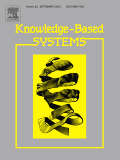
KNOWLEDGE-BASED SYSTEMS
Transforming Ideas into Intelligent SolutionsKNOWLEDGE-BASED SYSTEMS, published by ELSEVIER, is a leading international journal that has established itself as a cornerstone in the fields of Artificial Intelligence, Information Systems and Management, and Software Development. With an impressive track record of over 35 years in publication, this journal is highly regarded for its significant contributions to the understanding and advancement of intelligent systems, providing a platform for innovative research and applications. It boasts a strong impact factor, maintaining a Q1 ranking across multiple categories, including Management Information Systems and Decision Sciences, reflecting its prestige and relevance in the academic community. Researchers and practitioners alike benefit from access to high-quality, peer-reviewed articles that explore the intersection of knowledge management and transformative technologies. The journal's commitment to fostering interdisciplinary research encourages the dissemination of knowledge that shapes the future of intelligent decision-making processes. With a substantial audience that includes professionals, academics, and students, KNOWLEDGE-BASED SYSTEMS continues to be a vital resource for those at the frontier of technological advancement.

International Journal of Machine Learning and Cybernetics
Unlocking the Future of Machine Learning and CyberneticsInternational Journal of Machine Learning and Cybernetics, published by SPRINGER HEIDELBERG, serves as a pivotal platform for scholars and practitioners in the fields of Artificial Intelligence, Computer Vision, and Software Engineering. With its impressive Q2 and Q1 rankings in esteemed categories such as Artificial Intelligence and Computer Vision and Pattern Recognition, this journal boasts a commendable reputation within the academic community, further solidified by its Scopus rankings that place it in the top percentiles of its category. This journal covers critical advancements and research trends spanning the years from 2010 to 2024, facilitating knowledge exchange that drives innovation in machine learning and cybernetics. Although it operates under a subscription model, it remains accessible for extensive readership, comprising researchers, professionals, and students eager to advance their understanding in this dynamic and rapidly evolving discipline. Stay at the forefront of technology by engaging with the latest findings and methodologies published in this influential journal, identified by its ISSN 1868-8071 and E-ISSN 1868-808X.

Frontiers in Computer Science
Empowering researchers to share and innovate in computer science.Frontiers in Computer Science is a premier open-access journal published by Frontiers Media SA that has rapidly established itself as a prominent platform for scholarly research in the diverse and evolving field of computer science. With a notable impact factor reflecting its high citation rates, this journal aims to disseminate innovative findings and groundbreaking studies across multiple subdisciplines, including Computer Science Applications, Computer Vision and Pattern Recognition, and Human-Computer Interaction. Since its inception in 2019, and with a consistent trajectory from 2019 to 2024, it has garnered accolades, achieving Q2 ranking in several categories and an impressive Q1 in miscellaneous areas of computer science. Researchers, professionals, and students alike are encouraged to contribute to this dynamic journal that serves as a vital resource for advancing knowledge and fostering collaborative dialogue in the global computer science community. Frontiers in Computer Science is committed to providing open access to research, promoting unrestricted sharing of ideas and fostering innovation at the intersection of technology and society.

Frontiers of Computer Science
Advancing the Boundaries of Computational InnovationFrontiers of Computer Science is a leading peer-reviewed journal dedicated to advancing the field of computer science through the publication of high-quality research articles, reviews, and theoretical discussions. Published by HIGHER EDUCATION PRESS, this journal has gained significant recognition, currently boasting a prestigious impact factor and ranking in the Q1 quartile for both Computer Science (miscellaneous) and Theoretical Computer Science categories in 2023. With a focus on the intersection of computational theory and practical applications, it serves as a vital platform for researchers, professionals, and students alike who are eager to contribute to and stay updated with groundbreaking developments. The journal’s scope encompasses a wide range of topics, reflecting the diverse nature of computer science today. Operating from Beijing, China, it emphasizes Open Access, ensuring that vital research is readily available to the global academic community. With its convergence period spanning from 2013 to 2024, Frontiers of Computer Science remains committed to fostering innovation and scholarly dialogue that drives the future of technology.

JOURNAL OF MACHINE LEARNING RESEARCH
Cutting-edge Research for Tomorrow's Intelligent SystemsJOURNAL OF MACHINE LEARNING RESEARCH, published by MICROTOME PUBL, stands as a premier journal in the realms of Artificial Intelligence, Control and Systems Engineering, Software, and Statistics and Probability. With an impressive Q1 ranking across multiple categories and a prominent Scopus ranking that places it among the top journals in its field—ranked 1st in Mathematics and 20th in both Artificial Intelligence and Software—this journal serves as a vital resource for cutting-edge research and advancements in machine learning. Established in 2001, it has been committed to disseminating high-quality research findings and innovative methodologies, addressing the evolving challenges and opportunities in machine learning. Furthermore, the journal maintains a rigorous peer-review process, ensuring that only the most significant contributions are published. With open access options available and a strong user-friendly platform, it invites researchers, professionals, and students to engage deeply with the pioneering work in the field.
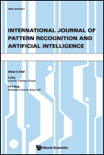
INTERNATIONAL JOURNAL OF PATTERN RECOGNITION AND ARTIFICIAL INTELLIGENCE
Pioneering the Future of Pattern Recognition and AIINTERNATIONAL JOURNAL OF PATTERN RECOGNITION AND ARTIFICIAL INTELLIGENCE, published by WORLD SCIENTIFIC PUBL CO PTE LTD, is a prestigious academic journal established in 1995 that serves as a critical platform for disseminating innovative research in the rapidly evolving fields of artificial intelligence, pattern recognition, and computer vision. With a focus on advancing theoretical and applied methodologies, the journal aims to bridge the gap between research and practical applications, making it essential reading for researchers, professionals, and students alike. The journal holds strong rankings within its categories, placing it in the Q4 for Artificial Intelligence, Q3 for Computer Vision and Pattern Recognition, and Q3 for Software as of 2023. Despite its growing influence, it continues to provide a rich resource for studies at the intersection of machine learning and computer science. The INTERNATIONAL JOURNAL OF PATTERN RECOGNITION AND ARTIFICIAL INTELLIGENCE not only contributes to academic discourse but also acts as a catalyst for technological advancement, making a significant impact on the scientific community.
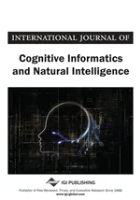
International Journal of Cognitive Informatics and Natural Intelligence
Fostering Collaborative Insights in Cognitive TechnologiesThe International Journal of Cognitive Informatics and Natural Intelligence, published by IGI Global, is an essential resource for researchers and professionals exploring the intersections of cognitive informatics, artificial intelligence, and human-computer interaction. Since its establishment in 2007, this journal has focused on advancing the understanding of cognitive systems and their applications in natural intelligence, contributing significantly to the fields of software engineering and interface design. Operating out of the United States, the journal aims to disseminate high-quality research and innovative methodologies to foster interdisciplinary collaboration. Despite its current standing in Q4 quartiles for the fields of Artificial Intelligence, Human-Computer Interaction, and Software, it serves as a vital platform for emerging scholars and seasoned professionals alike seeking to explore new frontiers in cognitive technologies. While it does not provide direct open access, these publications are instrumental in shaping academic discourse, and contribute to ongoing advancements in how we understand and integrate cognitive science into practical applications.
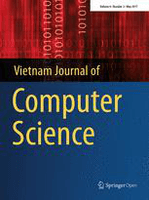
Vietnam Journal of Computer Science
Pioneering research that drives computational excellence.Vietnam Journal of Computer Science, published by World Scientific Publishing Co Pte Ltd, serves as a prominent platform for researchers and professionals in the rapidly evolving field of computer science. Launched as an Open Access journal in 2013, it aims to disseminate high-quality research across various subfields, including Artificial Intelligence, Computational Theory and Mathematics, Computer Vision, and Information Systems. With its ISSN 2196-8888 and E-ISSN 2196-8896, the journal provides valuable insights and contributes to the growing body of knowledge in computer science, particularly in Southeast Asia. Despite its relatively recent establishment, the journal has achieved significant rankings, including Q3 status in multiple categories and notable visibility in Scopus metrics, evidencing its commitment to fostering innovative research. This journal is essential for those looking to stay at the forefront of computational advancements and applications, particularly in Vietnam and beyond, facilitating an engaging dialogue among scholars and industry professionals.

Nature Machine Intelligence
Leading the Charge in Intelligent Technology DevelopmentNature Machine Intelligence, published by NATURE PORTFOLIO, is an esteemed academic journal that significantly contributes to the fields of Artificial Intelligence, Computer Vision, Human-Computer Interaction, and Software Engineering. Launched in 2019, this journal has swiftly ascended to prominence, holding Q1 status across multiple categories in the 2023 Scopus rankings, highlighting its rigorous peer-review process and high-quality research output. With an impressive 99th percentile ranking in key area categories such as Computer Networks and Communications, it has established itself as a vital platform for disseminating innovative research and fostering scientific dialogue among scholars and professionals. Although the journal is not open access, it provides a wealth of information to its audience, making it essential for those engaged in cutting-edge research and development. Academic institutions, researchers, and industry professionals can rely on Nature Machine Intelligence for the latest advances and methodologies in artificial intelligence-driven technologies.
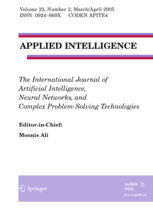
APPLIED INTELLIGENCE
Shaping the landscape of applied intelligence for tomorrow.Applied Intelligence is a prominent peer-reviewed journal that has been instrumental in advancing the field of Artificial Intelligence since its inception in 1991. Published by Springer, a reputable name in academic publishing, the journal focuses on the innovative applications of intelligent systems, algorithms, and methodologies across various disciplines. With an impressive Q2 ranking in the Artificial Intelligence category for 2023, and a Scopus rank of #117 out of 350 in its field, Applied Intelligence is recognized for its significant contributions and rigorous standards. The journal is accessed primarily through subscription, ensuring that high-quality research reaches the academic community and industry professionals alike. Its commitment to disseminating cutting-edge research makes it an invaluable resource for researchers, practitioners, and students interested in the practical implications of AI advancements. Join a community dedicated to exploring the transformative power of artificial intelligence and stay ahead in this ever-evolving field!